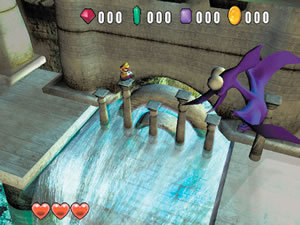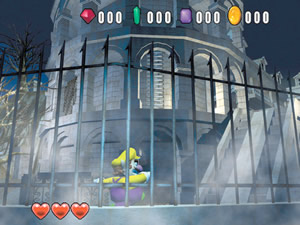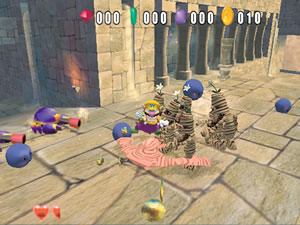What a freak.
Wario is something of an enigma. Donkey Kong and Bowser are clearly Mario’s
enemies, but Wario is just sort of this Bizarro
version of the lovable little plumber. Is he truly evil or does he just envy
his counterpart’s success? Who knows, but one thing’s for sure – the dude likes
money.
Yet one day, his greed got the best of him. While pilfering treasure, Wario
nabbed a cursed jewel that contains the power to destroy civilizations and render
apocalyptic doom. This cursed jewel decides to strike its revenge on Wario,
turning all his money into monsters.
And
thus begins Wario World, a game developed by the infamous Japanese development
team, Treasure. These are the same folks who gave us Gunstar Heroes,
Ikaruga and Radiant Silvergun, all solid games. But their track
record hasn’t been as good with 3D action games like Stretch Panic and
Mischief Makers.
Thankfully, Wario World rises above those past foibles with a simple
but fun trek through weird worlds, plenty of bosses and old-school fighting
action. A mesh of beat-em up button-mashing and typical action-adventure gameplay,
Wario World is a decent if short jaunt through the anti-Mario’s wacky
life.
The 8 stages of Wario World are best described as 2.5 D. Sometimes
the game moves within a singular plane, while at times Wario can move up and
down with an added axis of movement. During the flat stages, you can move the
camera forward a bit for a better look at the inclement challenges. The full
3D moments allow complete camera rotation. Each level features slight tangents
that hide treasures away in different nooks, encouraging some replay exploration.
There are little dropholes on each stage that lead to virtual challenges,
much like in Mario Sunshine or in Metal
Gear Solid’s VR rooms. These usually involve a direct A to B goal with a
red jewel as the reward. Acquiring these jewels allow you to challenge the boss
characters at the end of each level.
With a flurry of punches, Wario can stun his many enemies and then follow
through with some wrasslin’ moves, from a pile driver to a 360-degree swing.
In a nod to Luigi’s Mansion’s
vacuum system, Wario can open up his gaping maw and suck up all the loose change
around him. The suck up maneuver can only be used for money, though. It would
have added another dynamic if it were mixed into his fighting repertoire. If
Kirby can do it, why not Wario?
The enemies are essentially the same from level to level, but with different
appearances based upon the theme of the stage. There are the basic grunts, the
guys with the baseball bats, the flying fellas, and turtle-like
creatures with cannons strapped to their backs. Fighting these same basic
enemies with the same moves can get stale; a combo system that rewarded more
varied fighting would have really helped. But just when the fun starts to dip,
something weird shows up, like the flying magnet beasts that you can toss onto
a metal grate to create a step stool.
That kind of creativity is at its most prominent when challenging the end-level
bosses. There’s always some basic trick that needs to be figured out, usually
a timing or attack method. The bosses are the best part of the game.
 Wario
Wario
World utilizes an original system to generate health and continues. There
are various garlic vending machines distributed throughout a stage that let
you purchase additional health, and when Wario goes kaput, the game offers a
continues for a steadily increasing sum. It’s all about the Benjamins.
These continues bring you right back into the action, so they are best used while fighting the bosses. Otherwise, the inflationary cost of them can get downright nasty. You¹ll watch your earnings quickly sink just trying to keep the game going. But the inflation does work since some enemies regenerate, essentially allowing you to endlessly beat them up for more cash. This creates a replay skill dynamic usually found in shooters, which is a counterbalance to the shorter nature of the game.
Wario World can connect with the GBA via Wario Ware Inc., but
the connection benefits are limited. Several Wario Ware games can be
transferred onto your GBA if you don¹t already have it. The first one is free,
eh?
Though we don’t review GBA games at GR, Wario Ware is awesome, essentially
a collection of mini-games pared down to their most basic and then strung together
in rapid barrage. The games are as weird as they come, from nose-picking to
NES classic throwbacks. I wish there was more complete interactivity between
Wario Ware and Wario World, but each on its own is still complete.
The graphics aren’t the best with a tendency towards repetition, but the right
effects and touches have been utilized to create varied environments, including
staples like snow, desert, circus and jungle. Wario’s animations are spot-on,
and each of the weird enemies really captures the oddity of the world. I think
the game would have really looked sharp if they opted for more of a claymation
feel  some of the creatures look halfway there already.
The music plays up the action nicely and the sound effects are deliciously
evil, with Wario singing nah-na-na-nah-nah during the paused screens,
plus plenty of Wario outbursts left and right.
Wario is a strangely endearing lug. It comes through in his goofy walk and
his inexplicable self-confidence. I mean, here he is, ugly as sin, yet he still
struts his stuff. Wario World is equally goofy and strange, but in an
unassuming way, it’s also good, unpretentious fun.

-
Simple beat 'em up fun
-
Wonderfully weird
-
Good bosses
-
Inflation of continues
-
Inflation of continues
-
Fighting could use more variety, combos
-
Short
-
Limited











